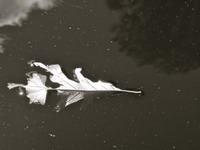
Bod. Jimbo gave me that word. Jimbo himself had quite a bod. Not like Victor’s, but not one to kick outta bed, either. I got that expression from Jimbo too - kick outta bed. The guys would sit around the beach, and talk about girls. How this one had a good bod or not. And then Jimbo would laugh and say, but I wouldn't kick her outta bed. They'd talk like that in front of me, even though I was a girl. They’d talk like that because I was one of them, a university student but more importantly, a lifeguard who had been hired by the town to supervise the waterfront for the summer.
Jimbo had brownish blonde hair, a tiny tight behind, and a crooked smile and chipped front tooth, the latter an imperfection that made him even more perfect. He'd wear his whistle tucked under the leg of his bathing suit, and his sunglasses perched atop his head.
Sunshine was a lifeguard, too. He had baby fine, sun-yellow hair that he wore to his shoulders, and he walked with an easy bounce. His hair would swing with the motion, swing back and out of his eyes. Then it would fall into his face again, and we loved him for it. Loved him, and the summer, and ourselves. The collective Us.
Sunshine swam. Every day. In the river in summer, and in the pool in winter. It was his religion. Built over years of devotion. He had broad shoulders, but he wasn't muscle-bound, not like weight lifters, stiff and awkward with their own bodies, with their own selves. Not like that at all.
And if we loved Sunshine for his baby fine hair, the way it moved in rhythm with his body, we also loved him for his swimming, the way he moved in rhythm with the water. Elbows lifted easily, almost lazily. It was deceptive, unless you paid attention to the power of his stroke, measured with your eye how far he travelled in a single pull.
Sunshine swam as if he belonged there, in the water, as if he breathed it in, and not air. It was a sight to behold, a thing of beauty, like our youth. We didn't know it then, bodies tanned deep brown, arm and leg hairs bleached blonde by the sun. Didn't know that it would end. That there'd come a time when we'd no longer wear our bodies naturally. No longer wear ourselves naturally.
*****
I’ve forgotten his name. He wore a green army jacket, and scuffed jeans, and long hair. He talked about peace, and hunger, and the need to redistribute wealth on a global basis. He raised consciousness, instead of his heartbeat. I doubt he owned a bathing suit.
We spent the weekend together. Not the kind of weekend where we fell off the cliff of friendship into the abyss of carnal sex. He asked me to sign up for a Starve-a-thon to bring attention to the plight of hungry people everywhere. Friday night, we played cards. We listened to music and sang peace songs. We snatched a few hours of sleep camp-style in bags spread over the hard floor. Saturday came. Our stomachs grumbled. Our backs ached. We drank fluids, and were unsatisfied, so we went for a walk.
We ended up in the produce section at a grocery store. I felt danger. It was seductive. I could eat an apple, a carrot, a head of lettuce, whatever I desired -- but I didn't. Outside and around the corner, my acquaintance pulled a candy bar from the pocket of his army coat. He unwrapped it, took a bite, and offered me a piece of chocolate.
What about the starv-a-thon? I protested. What about the principle of it? (Lifeguards believe in principles).
"Fuck principles," the boy whose name I can’t remember said, scornful that he had to explain. "No one gets hurt by me eating this lousy bar, 'cause nobody'll know. World hunger's publicized, and my stomach is full. What could be more perfect than that?"
Things were not as perfect as I had imagined.
_____
“Beach rats” were the regulars. Not the furry kind with four legs. Beach rats were the kids who'd come to the park like clockwork; in an earthquake, if one had happened. Most of them came to escape home, their own personal earthquakes.
Susie was five. Her big brother brought her every day. He was seven. A scar stretched like embroidery from the top of his chest to his navel. On cloudy cold days when there were few swimmers I'd sit Susie on my lap and brush her hair. The blond highlights would catch the sun's rays and glisten, and the matted snarls would transform into silk. The other kids refused to play with her. If she touched them, they'd scream bugs and run away. Susie, a creative little girl, could string curses together in combinations I'd never before heard. But when I'd brush her hair, she'd cuddle close to me. And for the moment, her world was perfect.
I spent my own little-girl years at Sunday school. I sang the church songs, earnestly promising to be “a candle burning in the night”. And like the song said, I believed “God sees the little sparrows fall, he sees them every one, and if God so loves the little ones, I know he loves me, too.”
My mother would dress me in clothes she made. One Easter, it was a coat of pink corduroy lined in silky taffeta. She sewed and sewed, a whirlwind of motor-noise, and corduroy, and pink thread. The Easter Bunny had come and gone, leaving chocolate eggs at the doorstep, and still she sewed. I heard a scream. Mom pulled the needle from her thumb. I wore the coat to church that morning, in awe of the fact that blood had been shed for me.
At some point I stopped letting Mom make my clothes, stopped going to Sunday School, stopped singing the church songs, and questioned God.
Victor Davis, Canadian Olympic speed swimming champion, flip-turning against metal, windshield, pavement. He died defending his girlfriend, car barrelling down upon them. Victor standing his ground. Juice bottle lifted above his head like Lancelot wielding a sword to protect Guenivere. Flinging the bottle at the last moment.In rage, perhaps, but with glory and honour nonetheless. Glory, and honour, and rage that belong only to youth.
_____
A psychiatric hospital stood at the edge of town. For the most part, we ignored the patients. A few of them, we adopted. Mainly outpatients. The ones who gave us nothing to fear, and made us smile. Ringo, standing on the corner of the main drag, singing Beatle songs, claiming to be the true Fab Four drummer, warning us not to be fooled by that cheap imitation who had snatched his body, but hadn't snatched his mind. The Laughing Man, who walked miles and miles each day up and down the same street, telling himself private jokes. Skippy, who pulled a wagon and delivered newspapers and never grew up, even though he had grey hair and walked with a limp because of arthritis.
And Chuck. Chuck was simple. Stupidly, dangerously simple. His eyes were quick, and calculating, and you knew he would kill you if you gave him the chance. He wore his trousers cut off to make shorts, edges frayed, his legs and body deeply tanned, chest and arms always bare, as if to make sure you saw his muscle. Made sure that you knew he could kill you with his bare hands.
One day, Chuck came to the beach. He circled behind me. I knew he was there, even though he had left my line of vision. "Don't even fucking think about it," I said, without turning around.
Think about what, I don't know, not even to this day. Nor do I know what I would have done if he had attacked me, instead of spitting in my direction, and then leaving. I just know I felt rage. Enough rage to throw myself in the path of a car.
_____
I remember Victor Davis vividly all these years later. How we’d crowd around the television set, watch him glare down the East Germans, their steroid-pumped bodies hardened rock. Watch him swagger to the swimmer’s block. It was a swagger to behold, not-too-fast-not-too-slow, his timing perfect, Victor perfect, his name itself strong with the promise of Olympic gold and victory. He was young and irreverent and invincible. And so were we. We worked hard. Played hard. Like Victor. It was as if nothing could touch us. We'd live forever. Just as we were. We were invincible. We had only to watch ourselves mirrored in each other to know it was so.
